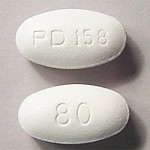 The beneficial cardiovascular effects of statins are anything but news. But a very large retrospective study from Taiwan may bring the utility of these drugs to an entirely new level it appears that the use of high dose statins significantly cut the risk of senile dementia in older people.
The beneficial cardiovascular effects of statins are anything but news. But a very large retrospective study from Taiwan may bring the utility of these drugs to an entirely new level it appears that the use of high dose statins significantly cut the risk of senile dementia in older people.
In a presentation to the 2013 meeting of the European Society of Cardiology, Dr. Tin-Tse Lin and Dr. Min-Tsun Liao of the National Taiwan University Hospital reported on a study that addressed some lingering concerns that statins may be linked to cognitive dysfunction. The results were quite surprising, to say the least.
Not only did the study allay these concerns, but it demonstrated a significant protective effect of statins against dementia. This is something that is essentially impossible now, despite an onslaught of research that is comparable to other enormous medical campaigns, such as HIV and cancer.
Lin and colleagues used a database of one million people covered by Taiwan's national health insurance program. From this sample, about 57,000 people (aged 65+) with no history of senile dementia were selected during the period of 1997-1998. Almost one-quarter of these participants were taking statins.
During the 4.5 year follow-up period, about 5,500 people developed non-vascular dementia (not caused by strokes or blockages).
But there was a substantial and dose-dependent difference in the number of dementia cases for participants who took statins the higher the dose, the bigger decrease in dementia. Also, the more potent statins showed a larger effect than the less potent.
For example, patients who took atorvastatin (Lipitor) had a decreased risk of developing dementia ranging from 34% to 70%, with the higher doses having the biggest effect.
ACSH s Dr. Josh Bloom says, This effect is called dose-dependence, and is very important for determining whether study results are real. A robust, consistent dose-response is a good sign that the study results are real rather than artifactual.
This effect is further validated by the fact that lovastatin (Mevacor), the least potent (and rarely used) statin showed no such protective effects, while the more potent drugs had the biggest effect.
So, what does this mean? Dr. Bloom notes, Since this is a retrospective study (albeit a very good one) it cannot prove that high dose statin use will protect you against senile dementia only that there is a strong association. Cause and effect can only be determined by a prospective controlled study.
He continues, But given the huge number of participants and the robust dose response, it would seem that they are onto something here. No you should not take high dose statins based on this study, but the results are certainly promising. Anything that can help combat Alzheimer s perhaps the most devastating of all diseases would be an enormous medical advance.


